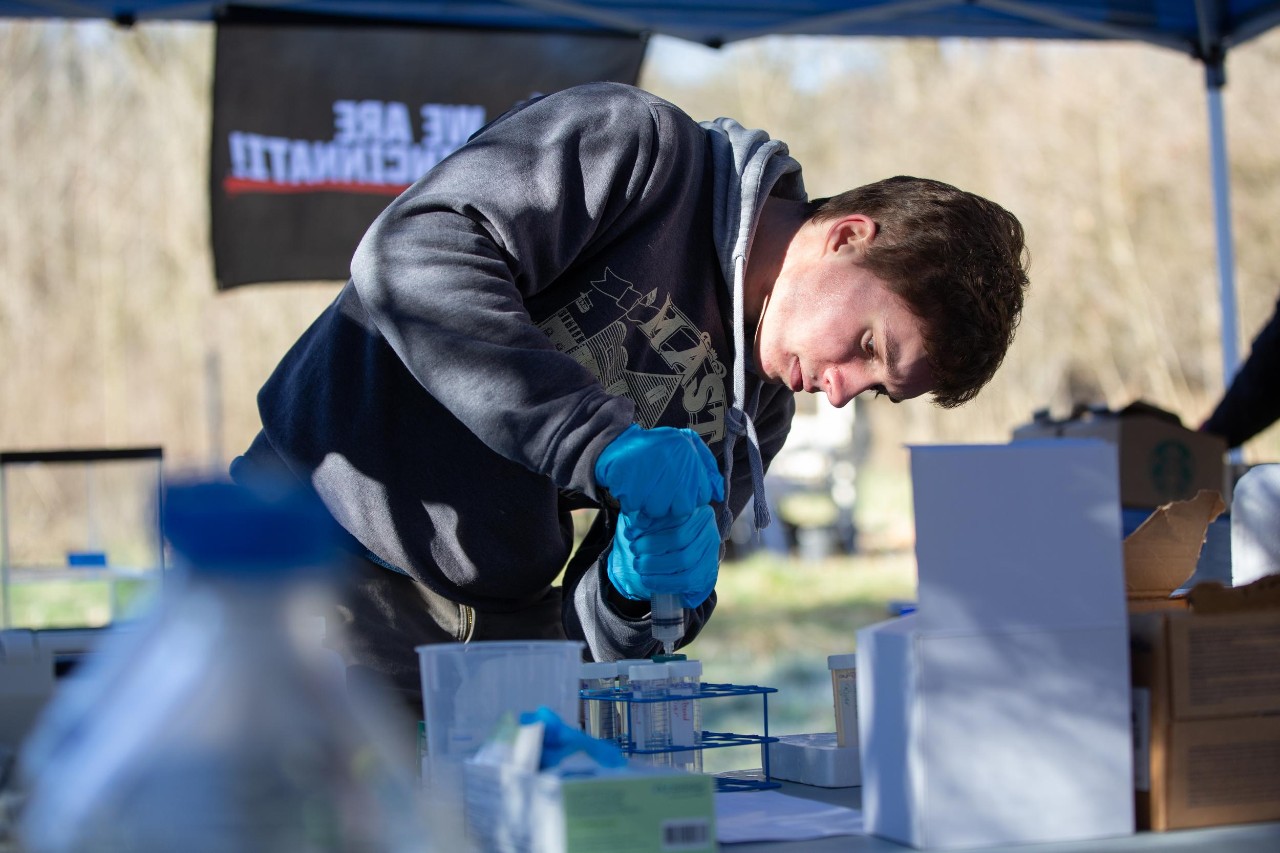
Local 12: UC investigates potential PFAS contamination in groundwater
UC launches a new water quality investigation along Great Miami River
Local 12 highlighted a new University of Cincinnati project to study water quality in southwest Ohio.
At the Theis-Nash Environmental Monitoring and Modeling Site along the Great Miami River, UC has studied the flow of water from the surface into the aquifer, a source of drinking water for much of southwest Ohio. These monitoring wells initially provided researchers with real-time data about the hydrodynamics of surface river water as it moved through the aquifer, particularly during periodic floods.

Assistant Professor Annette Rowe is studying the microbiology of groundwater along the Great Miami River. Photo/Andrew Higley/UC Marketing + Brand
Now the monitoring site named for UC Professor Emeritus David Nash and the late hydrogeologist C.V. Theis will turn its focus to excess nutrients like nitrogen and phosphorous and contaminants such as PFAS.
Groundwater is a source of drinking water for more than 2 million people in Ohio. Scientists are trying to understand what happens to chemicals such as PFAS, known as a forever chemicals, that leaches into the groundwater.
PFAS has been found in water along the entirety of the Ohio River.
UC microbiologist Annette Rowe, an assistant professor of biology, said many chemicals we release into the environment end up in our drinking water.
"The more we produce, the more we put into those ecosystems, the more they accumulate and have the potential to have detrimental impacts on every trophic level," she told Local 12.
We're just trying to understand what's going on and how big a problem it is. And every researcher's hope is that then will lead us to how do we fix these problems?" Rowe said.
UC is looking at ways microbes interact with the chemicals, which could make them less harmful to human health, Rowe said.
Featured image at top: UC students work with water samples at the groundwater observatory, which includes a network of monitoring wells. Photo/Andrew Higley/UC Marketing + Brand

Work crews dig a new monitoring well along the Great Miami River. Photo/Andrew Higley/UC Marketing + Brand
Related Stories
Mural by UC grad honors U.S. military history
July 17, 2024
Local 12 highlighted a new mural by University of Cincinnati graduate and artist Brandon Hawkins that pays tribute to U.S. military history.
Social media fuels extreme political rhetoric
July 17, 2024
UC College of Arts and Sciences Professor Jeffrey Blevins tells Local 12 that online algorithms fuel political polarization on social media.
NIS program opens new horizons for international student
July 17, 2024
In his pursuit of physics and a taste for research, Akash Khanikor ventured from his hometown in India's Assam to the University of Cincinnati, drawn by the promise of hands-on exploration early in his undergraduate career as a NEXT Innovation Scholar.
UC archivist explores Troy’s invisible workers
July 17, 2024
UC Classics archivist Jeff Kramer examined the unheralded and largely uncredited role laborers played in the 1930s excavation at Troy in Turkey.
From intern to full-time: Recent Lighting Design grad joins Bandit Lites
July 16, 2024
Lighting & Sound America spotlights recent graduate Riley Rowan's new position at Bandit Lites, a full-service design, management and producer of live events and entertainment.
CCM alum Donald Lawrence to be inducted into Cincinnati Black Music Walk of Fame
July 16, 2024
UC College-Conservatory of Music alumnus Donald Lawrence is part of the 2024 class of Cincinnati Black Music Walk of Fame inductees. Located at the Banks in downtown Cincinnati, the induction ceremony on July 27 will feature a parade of stars and a free concert by the Zapp Band.
U.S. stroke survival is improving, but race still plays role
July 16, 2024
U.S. News & World Report, HealthDay and Real Health covered new research from the University of Cincinnati that found overall rates of long-term survival following stroke are improving, but Black individuals experience worse long-term outcomes compared to white individuals.
Presidential challenge to UC: Join Ride Cincinnati to fight cancer
July 16, 2024
UC President Neville Pinto has again challenged every UC college and unit to send at least one rider to the September 14 Ride Cincinnati event to help fundraise for cancer research and cancer care. UC students ride free. Signup by July 31 for free UC-branded cycling jersey.
Pediatric ICU rates linked to housing quality, income, education
July 16, 2024
Healio highlighted research led by the University of Cincinnati and Cincinnati Children's Hospital's Carlie Myers that found a link between pediatric ICU admission rates and housing quality, household income and education.
How to deal with workers' summer slumps
July 15, 2024
A summer slump featuring a loss in the quantity and quality of work is common, and instead of fretting about it, organizations should just roll with it, a University of Cincinnati business professor told Orlando, Florida-based WKMG's Breakfast With Bridgett. Scott Dust, PhD, the Fealy Family Chair in Entrepreneurship and an associate professor in the Department of Management at the Carl H. Lindner College of Business, said summertime changes people's psyches.
